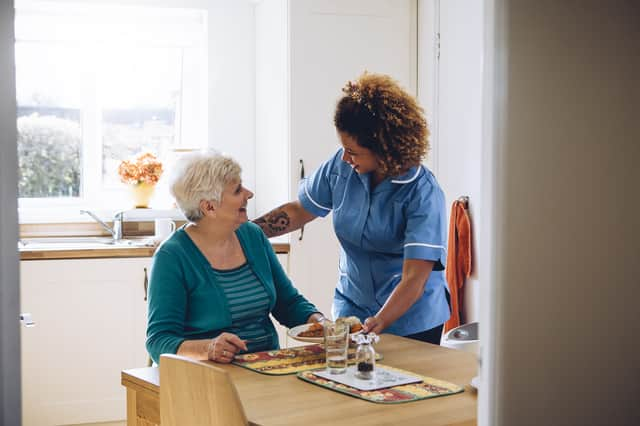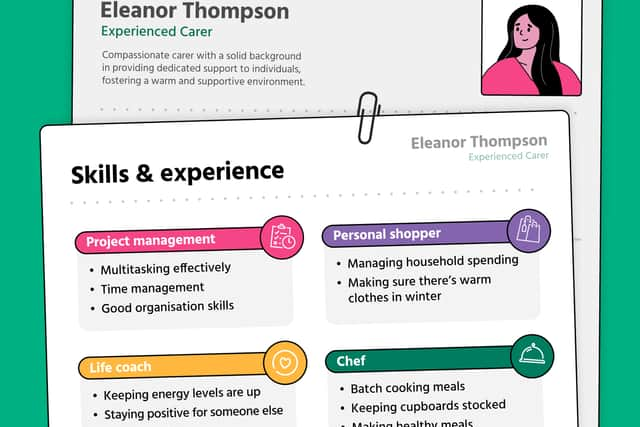The top 14 things unpaid carers wish they'd known at the start - including available financial support


Unpaid carers have revealed what they wish they'd known beforehand including how to get financial support, keep energy levels up - and manage the emotional toll.
How to become an expert multi-tasker, take time for yourself, and look after someone else’s household energy bills were also skills people wish they’d had when they took on the role.
Advertisement
Hide AdAdvertisement
Hide AdNine in 10 (89 per cent) of the 500 carers polled were not prepared for the amount of time and effort they would have to spend caring for a loved one.
And it took them an average of six months to incorporate caring into their lives.
Although 89 per cent said they had learned something valuable from the experience and applied that to their own lives.
Three in four (73 per cent) unpaid carers said a smart meter and in-home display had helped them to manage energy bills for someone else - and a quarter would recommend one to others in the same situation.
Advertisement
Hide AdAdvertisement
Hide AdPhillippa Brown, from Smart Energy GB, which commissioned the research, said: "Starting your caring journey can be daunting, but also incredibly rewarding.
“Six months can be a long time to get settled into caregiving, with so much to keep on top of and manage for the person you look after.
“Which is why it’s vital that unpaid carers know what support and tools are available to help them.
“From simple things like getting a smart meter installed for the person you look after to ensure their meter readings are sent automatically, to joining local carer networks, it all adds up and can make the task that little bit easier.”


Advertisement
Hide AdAdvertisement
Hide AdImportance of being open and sharing advice
Nearly six in 10 (58 per cent) believe it is ‘very important’ for unpaid carers to be open and talk to one another to share advice.
For 60 per cent of these, it’s to feel like they aren’t alone, and 57 per cent want to make a strong support network to get through difficult periods.
Just over half (51 per cent) want to share practical tips that will help make care tasks easier, and 43 per cent would like to make friends who are in a similar position.
And the top tip carers would give others in their situation would be simply to take it one day at a time (56 per cent), while 52 per cent would urge carers to take time for themselves when possible.
Advertisement
Hide AdAdvertisement
Hide AdJust under half (47 per cent) say spending quality time with the person in care, not just on admin or tasks, is important as well, according to the OnePoll.com findings.
Carers cited patience (65 per cent), being emotionally strong (51 per cent) and excellent time management (34 per cent) as the most valuable skills someone in their position can have.
And 32 per cent believe a smart meter has saved them some time when managing their loved one’s energy bills.
Phillippa Brown, from Smart Energy GB, added: “It’s clear from the OnePoll research that so many just weren’t prepared for the challenges of being a carer, but also half of those looking after someone hadn’t had advice from people in similar situations.
Advertisement
Hide AdAdvertisement
Hide Ad“I hope that hearing what has helped people thrive as caregivers will help others who are doing the same.”
The top 14 things unpaid carers wish they'd known at the start:
- What financial support is available
- How to manage the emotional toll of caring
- How to make sure you still have time for yourself
- How to make sure you still spend time with the person you care for, not doing care tasks
- How to keep your energy levels up
- How to multitask effectively
- How to keep track of medication
- How to understand how someone is feeling without verbal communication
- How to manage their household energy bills
- How to manage other household spending
- How to change a bed quickly
- How to fold down a wheelchair and get it in the car
- The best way to batch cook meals
- That you can use a disabled parking badge if you're driving on a disabled person's behalf
Comment Guidelines
National World encourages reader discussion on our stories. User feedback, insights and back-and-forth exchanges add a rich layer of context to reporting. Please review our Community Guidelines before commenting.